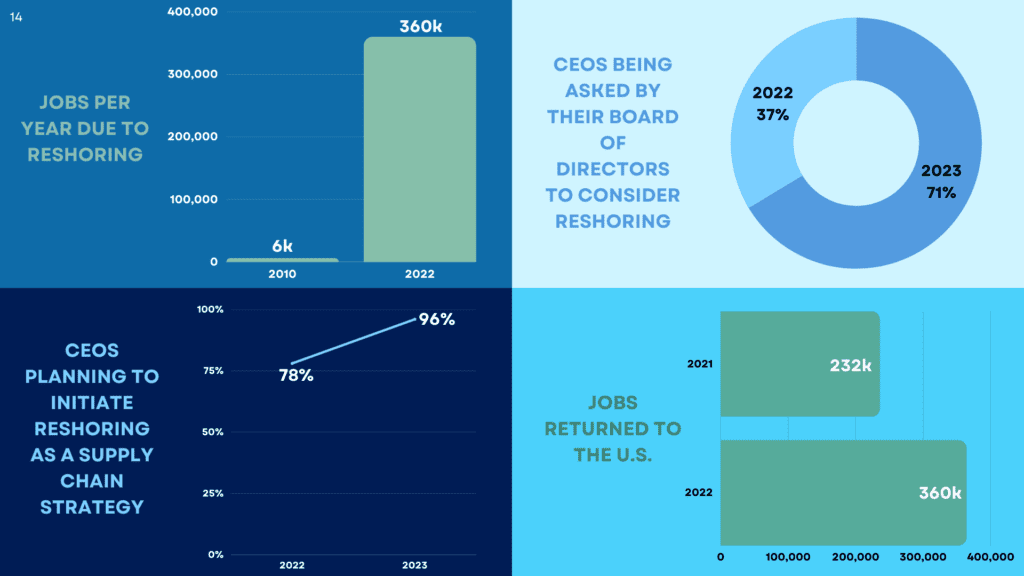November 9, 2023
Navigating Workforce Challenges in U.S. Manufacturing
For many years now, we have been following the explosion of jobs coming back to the United States, and with this, the challenges it has brought to U.S. manufacturing. Many reasons have called for this surge in open jobs, but to review the main sources of this increase, we can thank the following trends:
- “Made in America” is becoming increasingly popular among consumers. Buyers are now willing to pay more if the product is made domestically.
- The pandemic’s effect on the supply chain. Companies want the process of producing products from start to finish to happen within North America to regain of the supply chain.
- Reshoring. Over 400,000 jobs have been announced in the U.S. in 2023 from reshoring, compared to 5,700 in 2010.
- Investment in domestic manufacturing. The CHIPS and Science Act is a great example of direct investment. It is intended to strengthen America’s manufacturing capabilities and revitalize science and innovation.
To better comprehend the revolution of manufacturing in the U.S., refer to the charts below.


Currently, there are 779,000 open jobs in manufacturing in the U.S. If we continue this steady increase, there is a potential for 2.1 million unfilled jobs by 2030, resulting in a $1 trillion loss to the manufacturing industry. While supply chain challenges and technology updates are pressing issues for many manufacturers, the talent shortage is the overall most difficult challenge, and the issue is only getting worse.
Where do the challenges stem from?
Nearly 77% of employers globally reported difficulty in finding the skilled talent they need in 2023, which is nearly double those that reported difficulty in 2015. The global talent shortage is at a 17-year high! So, what can be done?
Recruitment and retention strategies!
According to the President of the Manufacturing Institute, Carolyn Lee, workers want more than just compensation, but rather are looking for career growth opportunities and a strong company culture. When Lee was asked what the top recruitment and retention issues facing manufacturers are, she responded,
“First, we have to change perception. Then we’ve got to help people with skills, or the baseline skills that prepare them for manufacturing careers, and then we have to help recruit them and then retain them. So it’s kind of the whole lifecycle.”
Changing the perception of manufacturing involves highlighting the career possibilities within the industry. Manufacturing jobs range from the plant floor to the C-Suite. whether that be in Operations, Engineering, Marketing/Sales, or Finance, there is a position for almost anyone in the industry. Compensation is also heavily regarded in manufacturing. The average salary of an individual in the manufacturing field is $98,000 yearly, while the average U.S. salary in general is only $59,000.
A few of the challenges in U.S. manufacturing regarding recruiting and retention and how to overcome them are broken down into these main categories:
Skills:
- Basic skills such as communication, teamwork, problem-solving, and safety awareness are essential in modern manufacturing.
- Specific skill sets vary across job functions, ranging from HR and finance to production, research and development, and beyond.
- Training programs need to be set into place to ensure the workforce is not only growing by numbers but growing by skill sets.
Wages, Benefits, and Inclusion:
- Manufacturing offers some of the highest wages across the economy, with an average manufacturing wage of $98,000.
- Inclusion is a key factor in retaining employees. Companies are encouraged to create a workplace where individuals feel heard, seen, and included.
- Employee resource groups and culture-focused activities contribute to retention, emphasizing the importance of close connections in the workplace.
Engaging More Populations:
- Closing the gender gap is a priority for the manufacturing sector, with the potential to fill all open jobs by a 10% reduction in the gap.
- Engaging individuals with exposure to the criminal justice system is identified as a significant labor pool, with initiatives in place to tap into this talent through partnerships with community organizations like Goodwill.
Difficult Positions to Fill:
- Specialized roles in automation engineering, data science, computer science, and cybersecurity are in high demand.
- Team leads, as well as roles in innovation and research and development, are also challenging to fill.
- Production roles are highlighted as having substantial opportunities for career growth, although they may be overlooked compared to more recognized engineering roles.
As the manufacturing landscape in the U.S. experiences a remarkable resurgence, driven by factors like the appeal of “Made in America” products, supply chain considerations, reshoring initiatives, and significant investments, the industry is facing a monumental challenge: the shortage of skilled talent. This surge in job opportunities, illustrated by the impressive growth in manufacturing jobs due to reshoring, brings with it both promise and a pressing need for strategic talent acquisition and retention.
Our recruiting firm has been closely monitoring these trends for years, recognizing the critical role that human capital plays in the success of the manufacturing sector. With a potential shortfall of 2.1 million jobs by 2030, the need for a comprehensive approach to talent access is more evident than ever. As the industry grapples with supply chain complexities and technological advancements, the looming talent shortage poses an even more significant threat to sustained growth.
Partner with Us in Navigating the Talent Challenge:
Acknowledging the complexity of the talent shortage issue, our recruiting firm stands ready to assist companies in their quest for skilled professionals in the manufacturing sector. Leveraging our experience and expertise in addressing workforce challenges, we offer tailored recruitment solutions to match the unique needs of your organization. Whether you are seeking candidates for specialized roles in automation engineering or aiming to enhance diversity and inclusion, our team is dedicated to helping you build a workforce that drives innovation and success.
As we approach the New Year, consider partnering with us to navigate the evolving landscape of U.S. manufacturing. Our commitment extends beyond filling open positions; we aim to contribute to the long-term success of your organization by aligning your workforce strategy with the dynamic demands of the industry. Let’s collaborate to attract, retain, and develop the talent that will fuel the next chapter of American manufacturing success.

